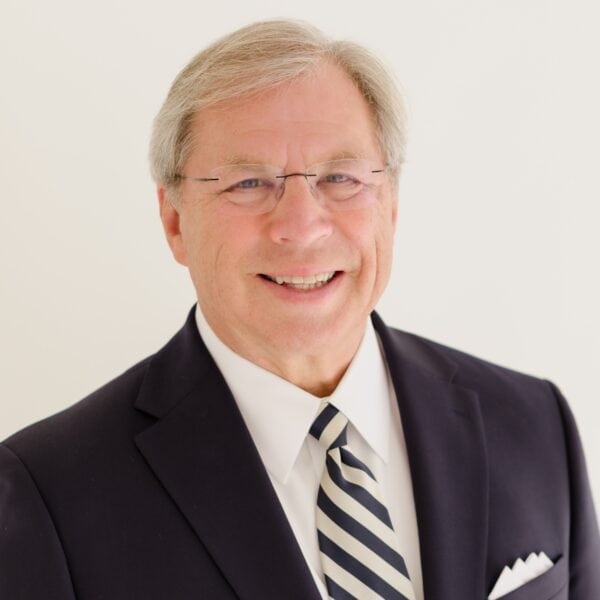Message from the President
John A. Day
2025-2026
Seventy-five years ago, the founders of the American College of Trial Lawyers initiated the effort to identify and recognize the United States’ leading trial lawyers. Wisely, the search was expanded to Canada, and the College became “an invitation-only Fellowship of exceptional trial lawyers from the United States and Canada who have demonstrated the very highest standards of trial advocacy, ethical conduct, integrity, professionalism, and collegiality.”
Each of the quoted words above is important. A lawyer cannot apply or lobby for induction into the College. Instead, lawyers are invited to fellowship after a rigorous investigation process that can take eighteen to twenty-four months.
The College has never been a bar association. It is a collection of trial lawyers who have each dedicated themselves to years of doing the necessary day-in, day-out work to be considered among the best in their field.
We accept only trial lawyers, not lawyers generally or those who merely litigate and mediate. Our Fellows are trial-tested and must have at least fifteen years of trial work before even being considered for Fellowship.
But it takes more than trying cases to be selected as a Fellow. We insist that a candidate be considered among the top skilled trial lawyers in a state or province, which we learn and verify after multiple, confidential conversations with co-counsel, opposing counsel, and judges.
Our investigation also examines a candidate’s reputation for honesty, professionalism, and collegiality. Our Fellows understand that the rules of ethics need to be honored, not treated as suggestions. We seek out those advocates who can disagree without being disagreeable. We require a demonstrated willingness and ability to work with others in a friendly, cooperative manner, as expressed in a positive answer to a question once posed by a now deceased leader of the College: “Would I want to spend an afternoon in a small fishing boat with the candidate?”
No longer relevant to the selection of Fellows is their field of trial practice. We have public defenders and prosecutors. We have medical malpractice defense lawyers and those who make a living suing health care providers. We have Fellows who represent the largest manufacturers in the world, as well as the lawyers who bring product liability lawsuits against those manufacturers. We have lawyers on both sides of the class action “v.” We have family law lawyers, condemnation lawyers, and public interest lawyers. In short, we recognize excellence can and does arise in every type of trial-related practice.
Geography and size of the law firm are not relevant. We have Fellows in our largest cities and very rural areas. We have Fellows in the largest law firms in the world, as well as solo practitioners. Political philosophy is not a factor, and neither is race, national origin, gender, or sexual orientation.
In short, we seek the best of the Trial Bar, and over the last seventy-five years, we have wisely, deliberately evolved to try to capture all who are worthy. That effort will continue in earnest.
Today, 5700 carefully selected Fellows stand behind the College’s effort “to preserve and enhance trial practice, civility, professionalism, and the administration of justice through support of an independent judiciary, the rule of law, trial by jury, and access to justice.”
The College continues to advance this mission through approximately 40 general committees and 62 state and province committees. For example, we endeavor to promote and enhance the level of trial advocacy through mentoring programs for law students and younger lawyers, trial training seminars, including one-day “boot camps” for young lawyers, and our successful multi-day trial advocacy programs. Our commitment to educating law students is best demonstrated by our 50-year partnership as co-sponsor of the National Trial Competition and our 25 years of co-hosting Canada’s Sopinka Cup.
Another example is the Judicial Independence Committee, which monitors developments related to the independence of the judiciary. This group develops public statements to educate the public on the role of the judiciary in protecting the rule of law, an essential component of not only our democracy and individual freedoms but also the smooth, predictable functioning of our economy.
Those are just two examples, but along with our State and Province Committees, each of our committees supports the mission of the College through its work. If you are a Fellow, there is a place for you should you wish to contribute your insight. And I hope you do, because it is the wisdom and experience of our Fellows that gives the College its strength.
In conclusion, I remember being in La Quinta, California, and hearing my name called during the College induction ceremony. I remember listening to the induction charge that has been given at every induction before and since. Since then, I have heard that same charge almost thirty times, and each time I flash back to that Saturday evening on March 16, 2002.
Now, I somehow find myself as the College’s 76th President, heading back to another Spring Meeting at La Quinta on the 24th Anniversary of my Induction. I am humbled beyond measure and so appreciative of the opportunity to serve and support the College’s meaningful work. My wife Joy and I hope to meet you during our travels and, with your help, endeavor to leave the College even better than we found it.
